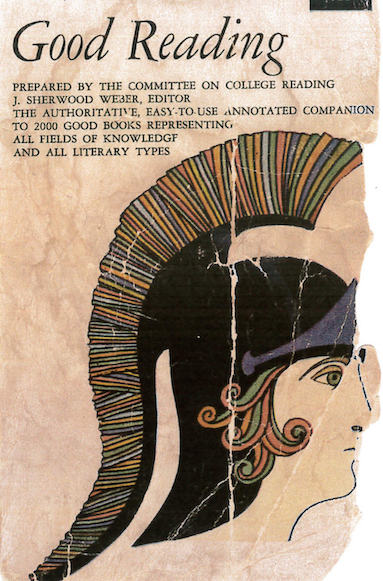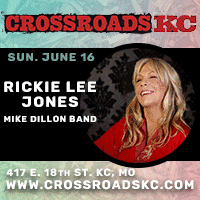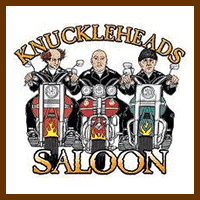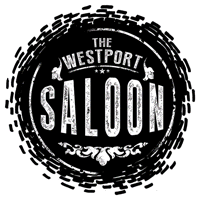When I was 12 years old I stayed home sick from school one time…
My mother brought me (along with hot soup and cold medicine) plenty of reading material. I still have the books, which followed me through many a move. By far and away the one that gave me ultimately the most reading pleasure was, improbably, a reference book.
It is a paperback (that cost $0.75 when it was published in 1964) called “Good Reading: A Helpful Guide for Serious Readers.” Edited by a professor at the Pratt Institute, a prestigious, private college in New York City, J. Sherwood Weber, the guide is broken into three sections: I. Regional and Historical Cultures, II. Literary Types (The Novel,The Short Story,Poetry,Drama,Biography,Essays, Letters, and Criticism), III. Humanities, Social Sciences, and Sciences.
Each category lists hundred of books, with a thumbnail sketch of what the book is about, together with the year published and the author’s dates. For example: under the section “The Novel: 19thCentury American” there is the following entry: “CRANE, STEPHEN 1871-1900, THE RED BADGE OF COURAGE (1895). This Civil War story divests that over-romanticized war – or any war – of much of its false glory. So vivid that its readers cannot believe that Crane had never known war firsthand, yet subtly symbolic and far-reaching in its implication.”
There are, all told, over four thousand books listed, on every conceivable subject. The task of compiling and organizing the different categories was done by a team of thirty college professors and book publishers, under Weber’s direction.
 The degree of organization, discernment and, above all else, confidence that went into preparing this guide means that it could never be replicated today. With moral and cultural relativism rampant, it’s hard to see how any academic or publisher could, for example, now be able to say that the following ninety American novels are the ones most worth reading written in the twentieth century. People nowadays insist that Tolstoy’s “War and Peace” has no more intrinsic value than television’s ‘Honey Boo-Boo.’ (After all, isn’t Tolstoy a ‘dead white male’?)
The degree of organization, discernment and, above all else, confidence that went into preparing this guide means that it could never be replicated today. With moral and cultural relativism rampant, it’s hard to see how any academic or publisher could, for example, now be able to say that the following ninety American novels are the ones most worth reading written in the twentieth century. People nowadays insist that Tolstoy’s “War and Peace” has no more intrinsic value than television’s ‘Honey Boo-Boo.’ (After all, isn’t Tolstoy a ‘dead white male’?)
This related to the idea of ‘The Canon’, defined as “the list of works considered to be permanently established as being of the highest.” Professor Harold Bloom, of Yale and New York University, has even written a book called “The Western Canon.” Dedicated to the proposition that Western Civilization is based on values embodied in acknowledged classics of literature and philosophy, this same organizing principle was the basis for other projects along similar lines over the years. The Harvard Classics and Clifton Fadiman’s “Life Time Reading Plan”, are just two of the better known examples. In this era of cultural relativism, where nothing is considered better than anything else, it’s heartening to remember that not that long ago the idea of recognized standards of excellence was widely – if implicitly – accepted.
None of these issues occurred to me, of course, until decades later. I was taught to respect authority (not “Question Authority” as the ‘70s bumper stickers say) and I took the recommendations of Professor Weber and his cohort of experts to heart.
Many times each year I’ve had recourse to ‘Good Reading’ to see what I should try next. By now I would guess I’ve read half of the books listed in the areas that interest me, i.e. heavy on literature and history, middling on art and architecture, and light indeed – I’m ashamed to say – on music,science, and philosophy. Since I’ve decided to retire and have more time for reading I may be able to finish off the remaining several hundred titles. Even if I dropped dead tomorrow, I feel I’ve gotten a whole second liberal arts education, separate and apart from my formal schooling, all courtesy of a parent’s thoughtful gift more than two generations ago.
The only drawback is that my guide dates from 1964. It was, in fact, the nineteenth in a series, published every few years since 1934. When the editor, J. Sherwood Weber, died in 1978, he was working on the 21st(and final) edition of ‘Good Reading’. This means, of course, that no one has brought the guide up to date for at least forty years. Do you think anyone would take on the task of updating The Canon? Who could even attempt it? An editor? A literary critic? A “public intellectual”? (Whatever that means!) Would it be worth it or is the whole concept outmoded?
Let me hear from you book lovers out there!










I was given a 1954 version of this in ’59 for my birthday (Ed. by Atwood H. Townsend.)
I still have the reference and have used it over the years as a guide for my daughters’ birthdays, Christmas gifts or “just because” purchases.
Hang on to it – over the years I’ve looked to update my copy to hardback only to discover that it’s been long out of print, and is (barely) available only via university libraries. Your copy is undoubtedly near to priceless.
Thanks for the assist. I appreciate you mentioning Atwood Townsend,who was the editor-in chief for the first twenty years that ‘ Good Reading’ was published and J. Sherwood Weber’s predecessor. After I wrote this post I saw that there was a new guide out in the last month or two. It’s called”1000 Books To Read Before You Die “,by James Mustich. The idea obviously still has some appeal.
As always, great article. Jay Sherwood Weber sounds like the teacher we all wish we had in our youth.
I actually read most of Bloom’s Western Canon, kind of… You know, the way you breeze through things really fast and don’t read all of the words. I’m just not that bright. No false humility.
James Joyce? Are you fuckin kiddin me? It’s like Proust on Valium to me. Bloom passed on Faulkner I think. So did I. Jesus.
Approaching middle age back in the 80’s, like an old boxer, whose record was as easily forgettable as a Ricky Nelson 45RPM, I realized, I never had and would never have a great punch and could barely hold a tune, or countenance any effort on my part to understand, or, try to understand, that which was so obviously beyond my capabilities. So I embraced my white trashyness and embraced Hemingway (Favorite, A Farewell To Arms) McMurtry (Best Book I ever Read-Enjoyed, Lonesome Dove.) Chandler, Hammett and their almost eerily uncontested heavyweight successor, Michael Connelly. Many others and, as always, advice from my many betters on what to read is appreciated.
Again, great article.
Deep into my dotage, I comfort myself in thinking, that, reading and enjoying books is gustibus non est disputandum, but, in reality, the truth is, I know Joyce is outta my fuckin pay grade.
Keep ’em comin Dwight!
Eats, Shoots & Leaves!